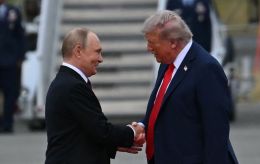Turning point: What is cause of protests in Georgia and why path to EU is hanging by thread
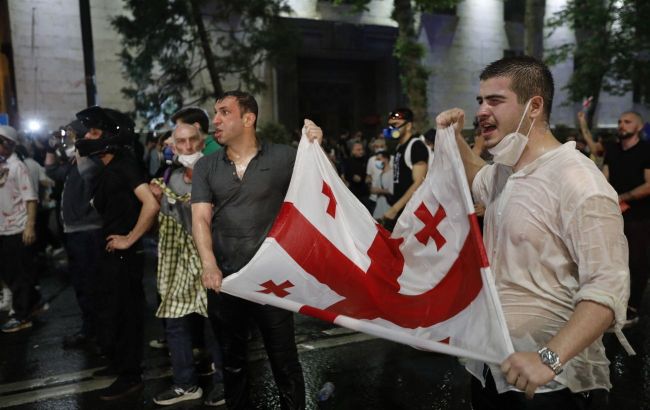 Photo: Demonstrators at protests in Tbilisi on April 30 (Getty Images)
Photo: Demonstrators at protests in Tbilisi on April 30 (Getty Images)
The protests in Georgia have been ongoing for over two weeks since parliament resumed consideration of the foreign agents law. Protesters refer to it as Russian law and argue that it will derail Georgia's course towards the European Union, a concern openly echoed by Western politicians.
The reasons behind the mass demonstrations, the threats to Georgia's European path, and whether the use of force will lead to a new revolution are discussed in the material by RBC-Ukraine.
The material was prepared using unformation from Novyny-Gruziya, Gruziya Online, BBC, RFI, statements from Georgian and Western politicians, and comments from Wojciech Wojtasiewicz, an expert on South Caucasus affairs at the Polish Institute of International Affairs (Warsaw).
Contents
- What's happening in Georgia
- 'Russian' law on foreign agents. What the government wants and why demonstrators are against it
- West's reaction and why EU accession is at risk
- What happens next and will the protests lead to the overthrow of the government
What's happening in Georgia
Ahead of protests in Tbilisi, which are being held under the slogan "No to the Russian law! Yes to Europe," erupted with renewed vigor. During the day, parliament was considering a bill on foreign agents in the second reading but didn't finish and postponed it to the next day. In the evening, thousands of protesters again gathered in the center of the Georgian capital, blocking Rustaveli Avenue.
The situation escalated when the crowd blocked the exits in an attempt to create a "corridor of shame" for the deputies of the ruling party Georgian Dream. Later, riot police appeared and used pepper spray against the participants of the rally.
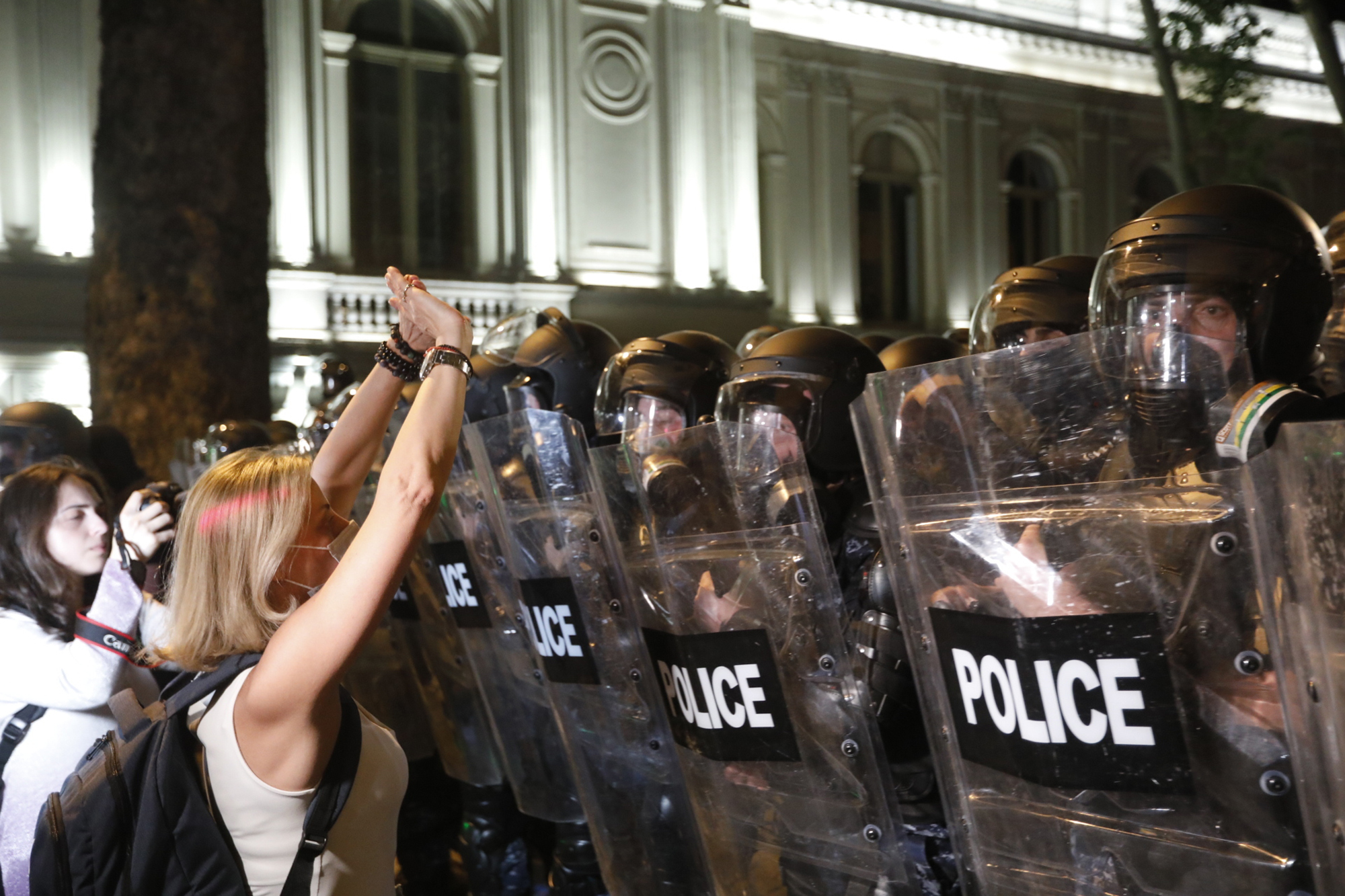
Photo: Protesters on April 30 in front of the police cordon (Getty Images)
Around 7:30 PM, law enforcement dispersed protesters near the parliament on Shio Chitadze Street and prepared water cannons. Deputies came out of the building and, amid shouts of "Slaves!", waited for the police to unblock the exits. Later, clashes began.
Around 8:00 PM, special equipment was brought to the government quarter. Pepper spray was dispersed near the back entrance to the parliament. Emergency medical teams reported providing assistance to 20 injured individuals. The Ministry of Internal Affairs announced the use of "proportional force" as people allegedly violated the rules of peaceful assembly. After an hour and a half, tear gas was released against the protesters on Rustaveli Avenue, and the participants of the rally began to dismantle barricades.
President Salomé Zourabichvili criticized the actions of law enforcement and called for an immediate cessation of the dispersal. According to her, the entire responsibility lies with the Georgian Dream government.
"Clearly that the rally remained peaceful, devoid of any imminent danger or threat to public order. It is regrettable that you chose to confront the youth, especially under the banner of national allegiance," she said, condemning the violence in the pre-Easter days.
Footage emerged online showing a man in a balaclava, standing alongside special forces, approaching a protester and hitting them in the face. In another video, a politician is roughly thrown to the ground. There are also reports of severe beating of the leader of the main opposition party United National Movement, Levan Khabeishvili.
After midnight, the special forces once again attempted to disperse the protests with water cannons. However, closer to 2:00 AM, they left the avenue, and the protesters returned to the parliament. According to the Ministry of Internal Affairs, about 60 people were detained during the rally, and six policemen were injured.
Today, deputies resumed the consideration of the controversial law. However, as local media report, the discussion was disrupted due to further clashes between representatives of the ruling party and the opposition. Speaker Shalva Papuashvili repeatedly muted the microphones of opposition members, and MP Salome Samadashvili from LELO and the leader of the Law and Justice party, Tako Charkviani, were expelled from the session.
Overall, the bill on foreign agents consists of 11 articles, but only three were discussed yesterday. It is expected that if the second reading passes soon, the third will be held in mid-May. Zurabishvili promised to veto it, but the Georgian Dream, which has the majority, is ready to override it.
Organizers have already announced that protests in Tbilisi will continue today, May 1st.
'Russian' law on foreign agents. What the government wants and why demonstrators are against it
The second wave of protests against the "Russian" law, as critics call it, has been ongoing for over two weeks. The main slogan "No to the Russian law" is heard at rallies, on television channels, and is widely reposted by social media users. Protesters are outraged by the government's plans to emulate Putin's Russia in combating foreign agents.
If the bill is adopted, non-governmental organizations and media outlets with over 20% of their annual income coming from foreign funding must register in three readings. This encompasses the vast majority of Georgian media and NGOs, which primarily operate with Western funds.
NGOs in Georgia are one of the most active and developed sectors of civil society. There is hardly any populated area where various civil projects – educational, cultural, charitable, etc. – funded by Western grants, have not been implemented.
They will also have to submit public financial declarations. Failure to register or submit a declaration could result in a fine of 25,000 lari, approximately 9,400 dollars. Moreover, the Ministry of Justice will have the authority to conduct monitoring and obtain various information, including personal data, to identify foreign agents at any time.
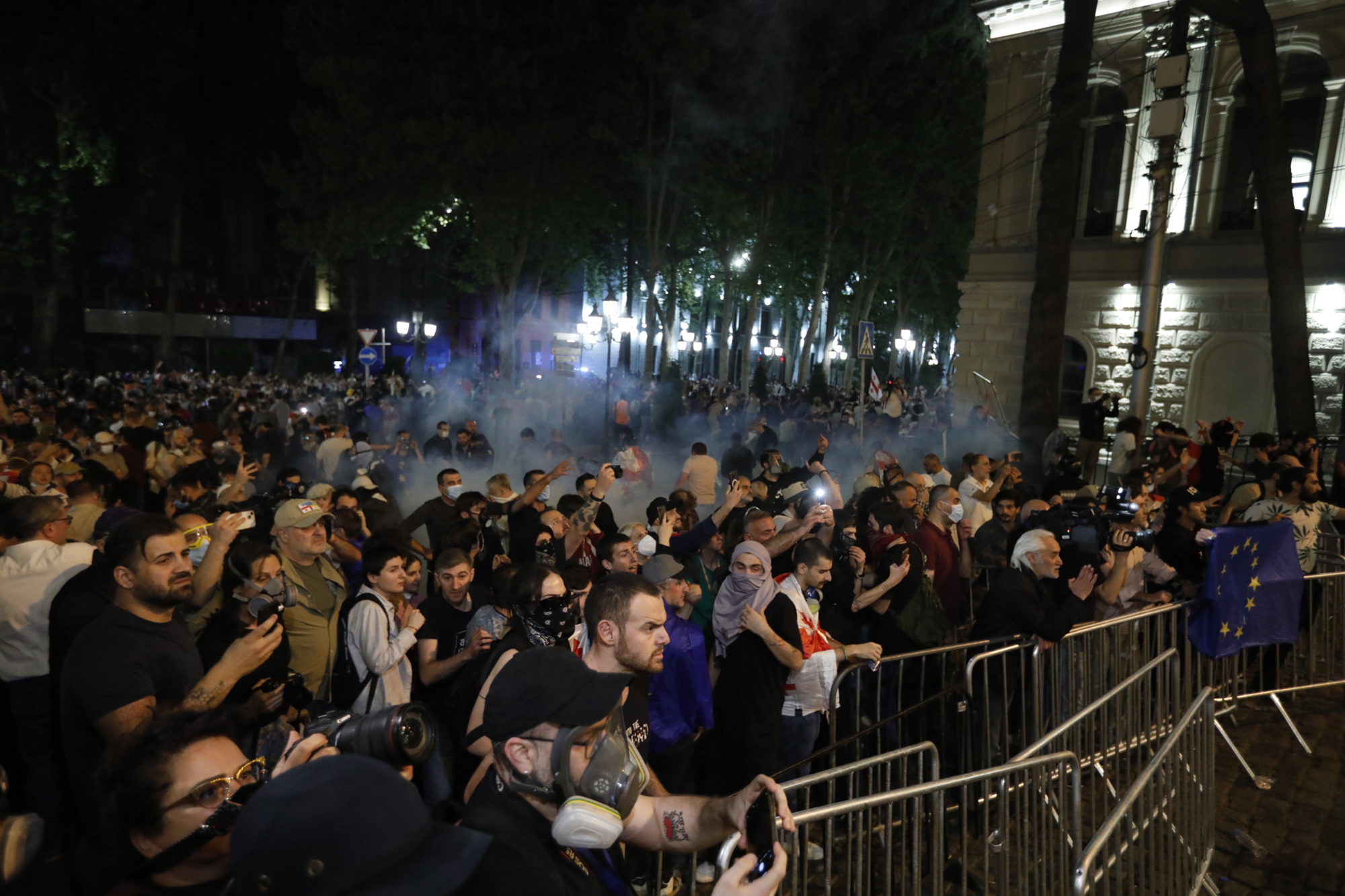
Photo: Protesters oppose the "Russian" law on foreign agents (Getty Images)
Interestingly, the first attempt to adopt the law failed back in March 2023 amid mass protests. At that time, the Georgian Dream party stated that the issue was off the table and they had no plans to revisit it. About a year later, the leader of the parliamentary majority, Mamuka Mdinaradze, announced the reintroduction of the bill with one key difference: the term foreign influence agent would be replaced with an organization acting in the interests of a foreign power.
Opponents are convinced that if it is adopted, it will become a tool of repression against dissent. Few believe that stricter amendments will not be introduced in the future, similar to what happened in Russia, where critical voices were silenced.
The ruling party's argument is that the law will promote transparency and accountability. Moreover, according to Prime Minister Irakli Kobakhidze, it is based on these European values. Statements from Western partners, such as the EU and the US, directly indicate the opposite. For example, the President of the European Council, Charles Michel, emphasized that the law would distance Georgia from the European Union since it could limit freedom of expression and, consequently, hinder European integration.
Earlier, Kobakhidze also stated that the main purpose of the law is to "protect against Ukrainization" and claimed that NGOs allegedly wanted to organize a revolution.
"If NGOs had achieved what they actively tried to do in 2020-2022, namely a change of power through revolution, then today Georgia would be in a worse situation than Ukraine, which means that both peace and European integration would remain in the past," he said, causing outrage from the Ukrainian Ministry of Foreign Affairs.
On Monday, at a pro-government rally, oligarch and founder of the Georgian Dream Bidzina Ivanishvili criticized the convicted former president Mikheil Saakashvili, stating that from 2004 to 2012, the country was ruled by "appointed foreign agents." He emphasized that the funding of NGOs allegedly is the main tool for appointing power in Georgia from abroad.
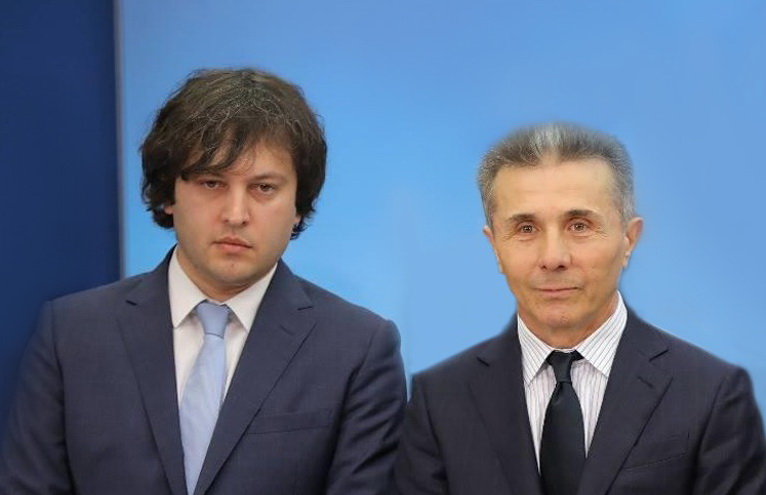
Photo: Prime Minister of Georgia Irakli Kobakhidze and founder of the Georgian Dream party Bidzina Ivanishvili (wikimedia.org)
Obviously, such statements are made against the backdrop of the upcoming parliamentary elections scheduled for autumn. Wojciech Wojtasiewicz, an expert on South Caucasus affairs at the Polish Institute of International Affairs, believes that even without this pressure, the ruling party could confidently win them.
"The Georgian Dream enjoys very high support, around 40%. The opposition is very weak, with many different parties, but they cannot unite. However, there is an idea that Ivanishvili is afraid of losing, despite the current ratings," he emphasized in a comment to RBC-Ukraine.
According to him, there are many media outlets in the country financed by Western money. They write about corruption and how the government sabotages reforms necessary to start negotiations for EU accession. Most likely, Ivanishvili thinks that if he can silence them, victory will be assured.
He explains the dissatisfaction of protesters by the similarity between the law on foreign agents and the Russian one, where NGOs and independent media have been nearly eradicated in recent times.
"It seems that the same plan is being prepared for Georgia. The opposition and the youth are against it; they don't want Georgia to have the same political system as Russia. Everyone is shocked that the Georgian Dream is again bringing the law to a vote. I know there are dissenters within the party as well, but Ivanishvili doesn't want to hear about it at all," the expert added.
West's reaction and why EU accession is at risk
In December 2023, Georgia was granted candidate status for EU accession, with the caveat that it takes steps to align with the recommendations of the European Commission. These include deoligarchization, judicial reform, addressing political polarization, and others.
According to polls, the majority of the population consistently supports joining the EU. However, due to the law on foreign agents, there are growing doubts about whether the ruling party is adhering to the will of the people and its declared pro-Western course.
Even before the first reading, the EU Ambassador to Georgia, Paweł Herczyński, stated that the bill is incompatible with European norms and values. He also warned that this initiative could slow down the accession process. Immediately after the vote on April 17, similar statements were made by the EU High Representative for Foreign Affairs and Security Policy, Josep Borrell, and the EU Commissioner for Neighborhood and Enlargement, Olivér Várhelyi.
"This is a very concerning development and the final adoption of this legislation would negatively impact Georgia’s progress on its EU path. This law is not in line with EU core norms and values. The proposed legislation would limit the capacity of civil society and media organisations to operate freely, could limit freedom of expression and unfairly stigmatise organisations that deliver benefits to the citizens of Georgia," the statement read.
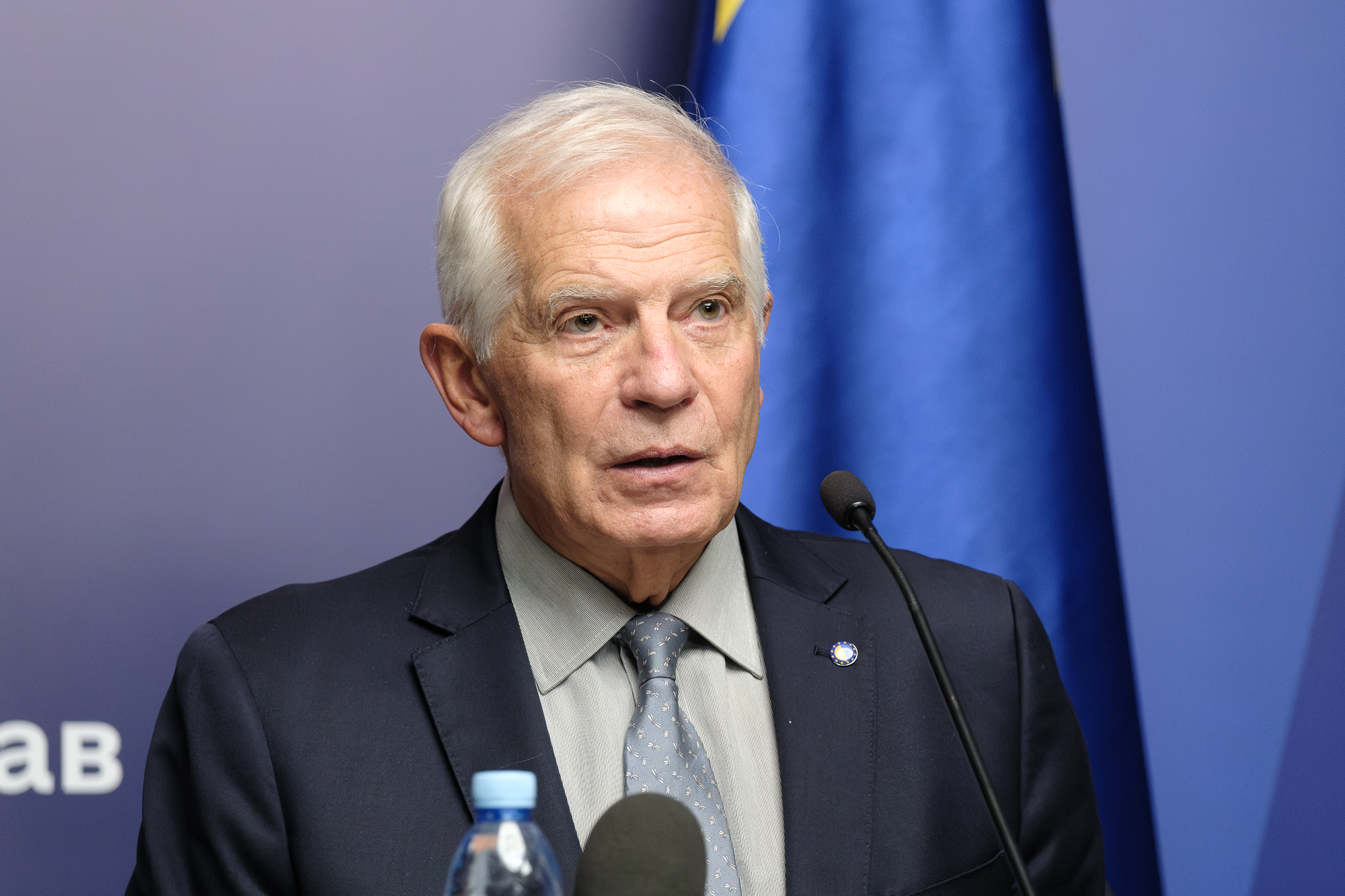
Photo: EU High Representative for Foreign Affairs and Security Policy Josep Borrell and European politicians believe that the law will block Georgia's path to the EU. (Vitalii Nosach/RBC-Ukraine)
US State Department spokesperson Matthew Miller expressed disappointment with the law on foreign agents, inspired by the Kremlin, while NATO Secretary General's Special Representative for the Caucasus and Central Asia, Javier Colomina, called it a step backward on the path to the Alliance, and Lithuanian President Gitanas Nauseda stated that Tbilisi is drifting away from European ideas.
Last week, the European Parliament adopted a resolution calling for no initiation of EU accession negotiations if the law is passed, and for sanctions against Ivanishvili. Today, German MEP Viola von Cramon stated that in response to the crackdown on protests, Brussels should revoke candidate status for Georgia and halt project funding.
Wojciech Wojtasiewicz believes that the foreign agents legislation will put an end to Georgia's aspirations for EU membership. Of course, in the future, the parties may return to negotiations, but only after implementing reforms.
"Even though it will be difficult to do with this government. Their main goal is to stay in power. And all these reforms, as they think, will not help them win elections," he said.
The protests in Tbilisi are already being compared to the events on the Maidan in Kyiv in 2013-2014. Back then, it all started with pro-European-minded youth coming out to defend the Association Agreement with the European Union. Those events were decisive for Ukraine's European choice, but they resulted in clashes with hundreds wounded and killed, led to the overthrow of Viktor Yanukovych, and became the pretext for Russia's military aggression.
"This is indeed such a turning point. It doesn't mean that if this law is passed, everything is over for Georgia as a European country. But it at least means that there will be no progress towards Euro-integration with this government," RFI quotes the director of the Caucasus Institute for Peace, Democracy, and Development, Gia Nodia.
What happens next and will the protests lead to the overthrow of the government
It's hard to say right now how events will unfold. Part of the uncertainty stems from the fact that the opposition lacks a specific face, lacks a strong leader. Most protesters are against Ivanishvili, but that doesn't mean they're in favor of Saakashvili returning to power.
"Overall, no, they don't like either. The problem is that the new generation hasn't created a political force that unites, there's no single leader. People from different organizations take to the streets. And for Georgian politics, individuals matter more than parties or any political programs," explains Wojtasiewicz.
According to him, much depends on what Georgian Dream does today, tomorrow, and the day after tomorrow, and how the law enforcement, who execute the government's orders, behave. Most likely, if the authorities don't give in, even more demonstrators will take to the streets.
Drawing parallels with events in Ukraine a decade ago, he reminds that there were different stages of the protests. There were days when hundreds of thousands took to the streets, then the tension eased, but the orders to shoot at people became the moment that changed everything.
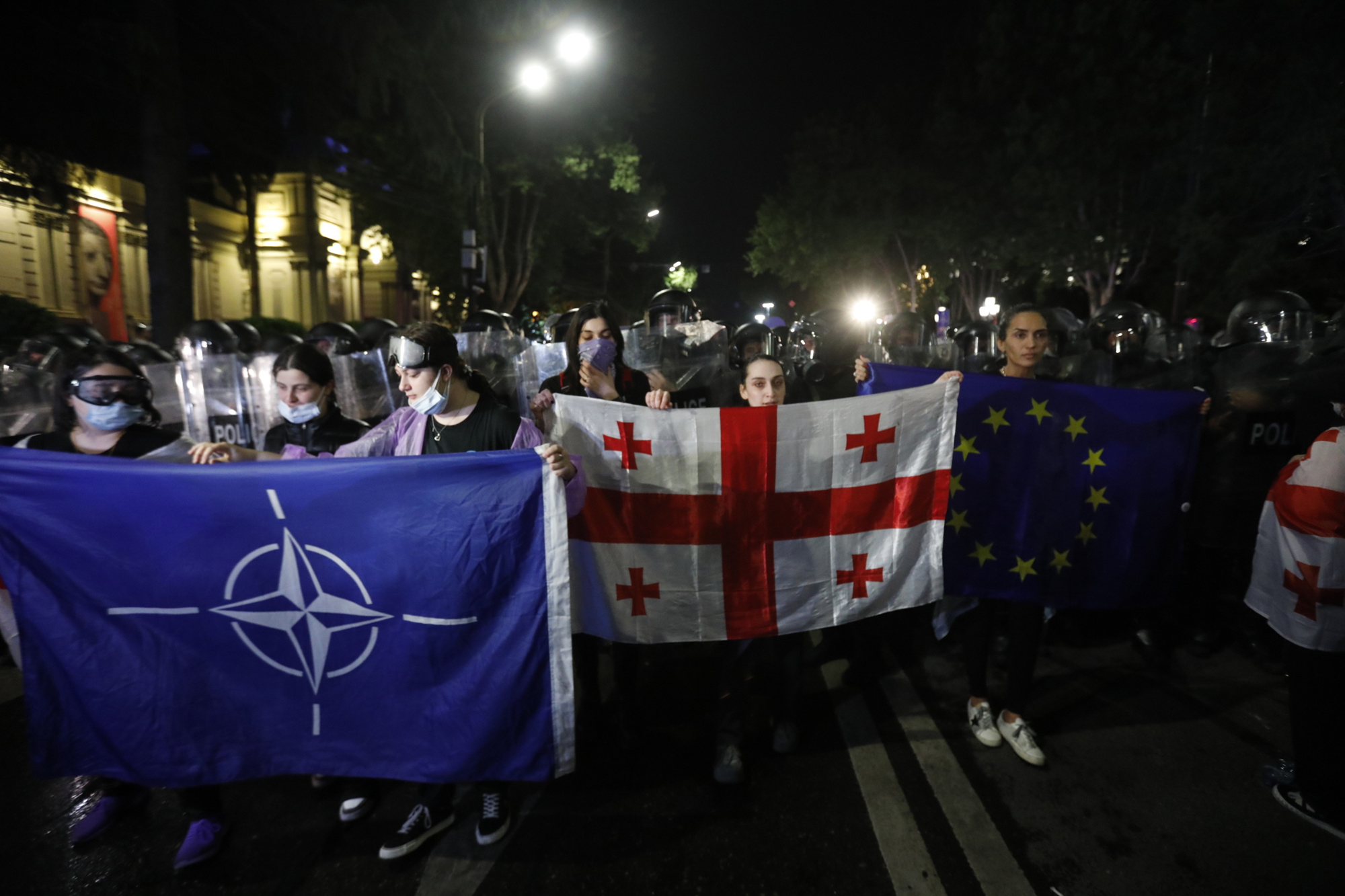
Photo: Protesters in Georgia lack a strong leader (Getty Images)
At the same time, the expert finds it difficult to assess the current protest potential. Today, it's hard to say definitively whether the dispersal of large-scale actions will lead to escalation and whether Georgians are ready to confront law enforcement. Now everything is in the hands of Georgian society. If large protests continue, it could mean the end of the Georgian Dream party's rule, for example, following the scenario of the relatively soft Rose Revolution of 2003.
"Perhaps the situation will develop along these lines, but it's hard to say for sure right now. It seems to me that all options are on the table at the moment. If the Georgian Dream decides that all of this is a mistake, the reason for the protests will disappear. And if it comes to violence, then the possibility of armed struggle on the streets is possible," he added in a conversation with RBC-Ukraine.
As of the evening of May 1, it is known that the organizers of the protests have not abandoned their plans and today intend to block the streets of Tbilisi and picket the parliament. The Ministry of Internal Affairs mentions the possibility of holding a peaceful rally near the main and rear entrances but warns that police cordons will be deployed.

